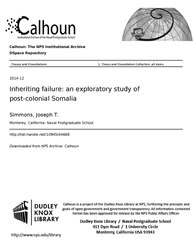File:Inheriting failure- an exploratory study of post-colonial Somalia (IA inheritingfailur1094544668).pdf
Appearance

Size of this JPG preview of this PDF file: 463 × 599 pixels. Other resolutions: 185 × 240 pixels | 371 × 480 pixels | 593 × 768 pixels | 1,275 × 1,650 pixels.
Original file (1,275 × 1,650 pixels, file size: 708 KB, MIME type: application/pdf, 76 pages)
File history
Click on a date/time to view the file as it appeared at that time.
| Date/Time | Thumbnail | Dimensions | User | Comment | |
|---|---|---|---|---|---|
| current | 02:16, 22 July 2020 |  | 1,275 × 1,650, 76 pages (708 KB) | Fæ | FEDLINK - United States Federal Collection inheritingfailur1094544668 (User talk:Fæ/IA books#Fork8) (batch 1993-2020 #18836) |
File usage
No pages on the English Wikipedia use this file (pages on other projects are not listed).



